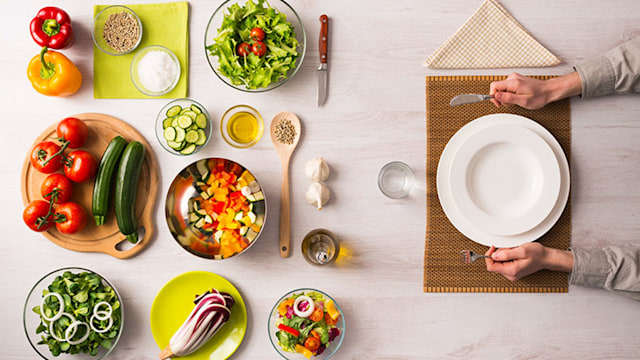As we age, our skin becomes thinner and more fragile, and starts to need constant hydration and nourishment in order to stay in the best condition. Collagen makes up about 95 per cent of our dermis, but as we get older it depletes, which can cause your skin to sag and wrinkles to appear.
Luckily, there are easy changes you can make in your diet to help nourish your complexion – and nutritionist Sarah Flower has revealed her top tips on how to do this exclusively with HELLO! Online…
There are easy diet changes that could protect your skin from signs of ageing
Avoid: sun damage
Sun exposure can seriously damage the skin. The sun’s ultraviolet rays can cause us to produce an abnormal level of Elastin, which the body tries to repair, causing scar tissue which helps to create more wrinkles. Sun exposure also causes pigmentation which can often appear as brown spots on the skin. To reduce sun damage, limit exposure to the sun and use a good zinc oxide based sun-cream, as others can contain carcinogenic ingredients.
Try: Marine Collagen
This a real must-have for skin repair. Applying Collagen topically does not have the same impact as orally as the molecules are too large for the skin to absorb fully, so try a liquid supplement such as Collagen Extra Marine, which also contains Hyaluronic Acid, vitamins and Magnesium.
Sun damage can wreak havoc on your complexion
Try: Astaxanthin
Found in Krill Oil, salmon, lobster and crab, this is a great antioxidant which can also help protect from premature ageing when combined with Vitamin E. It helps to lubricate the skin, improve elasticity and reduce pigmentation and dark circles under the eyes. It also boosts skin cell regeneration, helping to repair and renew the skin. Packed with Omega 3, Krill Oil is also a good antioxidant and a powerful anti-inflammatory.
Avoid: not drinking enough water
Our skin and body needs water in order to detoxify and process essential nutrients. It also helps to plump up the skin, giving a far better appearance as we age. In addition to drinking water, try to limit your caffeine and alcohol intake and to eat plenty of hydrating foods such as cucumber, melon, fruits and green leafy vegetables.
Try: hyaluronic acid
This gel-like substance can hold almost 1000 times its own weight of water which helps puff up the skin and is extremely hydrating.
Drinking enough water could help to plump up the skin
Avoid: ignoring outbreaks of spots
Our skin is the largest organ in our body, and along with our kidneys and liver, helps us to detoxify. Outbreaks of spots and rashes can be a sign your body needs to have a good clear out. Limiting processed foods, alcohol and sugars can make a massive difference to your skin's health.
Try: Carotenoids
Fill up with real food, packed with nutrients including colourful vegetables such as carrots, sweet potatoes, green leafy vegetables and squash. These are packed with carotenoids, especially beta-carotene which can help nourish and protect the skin from damage. Lutein is found in green leafy vegetables such as spinach or kale. This helps protect the skin from damage and increases hydration and skin elasticity.
Avoid: too much sugar
Limiting or cutting out sugar altogether can really improve problematic skin, as well as increasing your energy and reducing your waistline. Sugar produces AGE’s, (Advanced Glycation End products) and produces glycated collagen which ages the skin, makes it less flexible and produces wrinkles. More glycated collagen is produced from fructose, so avoid high fructose corn syrups, fruit concentrates and smoothies. You can also get more AGE from eating a diet rich in fried foods.
For more information head to thecollagenshop.com
